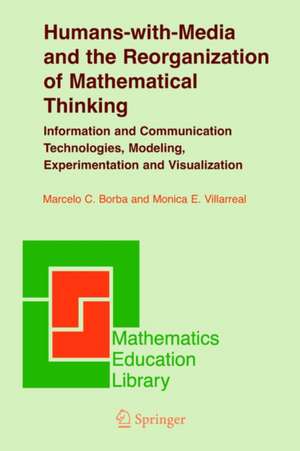Humans-with-Media and the Reorganization of Mathematical Thinking: Information and Communication Technologies, Modeling, Visualization and Experimentation: Mathematics Education Library, cartea 39
Autor Marcelo C. Borba Prefață de U. D'Ambrosio Autor Monica E. Villarrealen Limba Engleză Paperback – 19 iun 2006
| Toate formatele și edițiile | Preț | Express |
|---|---|---|
| Paperback (1) | 385.84 lei 6-8 săpt. | |
| Springer Us – 19 iun 2006 | 385.84 lei 6-8 săpt. | |
| Hardback (1) | 644.82 lei 6-8 săpt. | |
| Springer Us – 22 mar 2005 | 644.82 lei 6-8 săpt. |
Din seria Mathematics Education Library
-
 Preț: 389.70 lei
Preț: 389.70 lei - 15%
 Preț: 645.96 lei
Preț: 645.96 lei - 18%
 Preț: 742.97 lei
Preț: 742.97 lei - 18%
 Preț: 1394.84 lei
Preț: 1394.84 lei - 18%
 Preț: 947.50 lei
Preț: 947.50 lei - 18%
 Preț: 1544.80 lei
Preț: 1544.80 lei - 15%
 Preț: 652.49 lei
Preț: 652.49 lei - 18%
 Preț: 1385.67 lei
Preț: 1385.67 lei - 18%
 Preț: 1225.48 lei
Preț: 1225.48 lei - 15%
 Preț: 643.34 lei
Preț: 643.34 lei - 18%
 Preț: 1221.07 lei
Preț: 1221.07 lei - 18%
 Preț: 952.89 lei
Preț: 952.89 lei - 18%
 Preț: 950.52 lei
Preț: 950.52 lei - 24%
 Preț: 1445.40 lei
Preț: 1445.40 lei - 18%
 Preț: 1224.54 lei
Preț: 1224.54 lei - 15%
 Preț: 651.19 lei
Preț: 651.19 lei -
 Preț: 391.61 lei
Preț: 391.61 lei - 18%
 Preț: 948.16 lei
Preț: 948.16 lei - 18%
 Preț: 944.19 lei
Preț: 944.19 lei - 18%
 Preț: 1380.95 lei
Preț: 1380.95 lei - 18%
 Preț: 947.85 lei
Preț: 947.85 lei - 18%
 Preț: 948.61 lei
Preț: 948.61 lei - 15%
 Preț: 635.31 lei
Preț: 635.31 lei - 15%
 Preț: 644.63 lei
Preț: 644.63 lei - 15%
 Preț: 646.43 lei
Preț: 646.43 lei - 15%
 Preț: 647.59 lei
Preț: 647.59 lei
Preț: 385.84 lei
Nou
Puncte Express: 579
Preț estimativ în valută:
73.84€ • 76.28$ • 61.45£
73.84€ • 76.28$ • 61.45£
Carte tipărită la comandă
Livrare economică 25 martie-08 aprilie
Preluare comenzi: 021 569.72.76
Specificații
ISBN-13: 9780387328218
ISBN-10: 0387328211
Pagini: 232
Ilustrații: XXII, 232 p. 42 illus.
Dimensiuni: 155 x 235 x 14 mm
Greutate: 0.36 kg
Ediția:2005
Editura: Springer Us
Colecția Springer
Seria Mathematics Education Library
Locul publicării:New York, NY, United States
ISBN-10: 0387328211
Pagini: 232
Ilustrații: XXII, 232 p. 42 illus.
Dimensiuni: 155 x 235 x 14 mm
Greutate: 0.36 kg
Ediția:2005
Editura: Springer Us
Colecția Springer
Seria Mathematics Education Library
Locul publicării:New York, NY, United States
Public țintă
ResearchCuprins
Why Another Book about Technology and Mathematics Education?.- Information Technology, Reorganization of Thinking and Humans-with-Media.- Modeling as a Pedagogical Approach: Resonance with New Media.- Experimental-with-Technology Approach: Resonance with Modeling and Multiple Representations.- Visualization, Mathematics Education and Computer Environments.- Modeling and Media in Action.- Experimentation, Visualization and Media in Action.- Mathematics and Mathematics Education On-Line.- Methodology: An Interface between Epistemology and Procedures.- Political Dimensions of Information and Communication Technology.
Textul de pe ultima copertă
This book offers a new conceptual framework for reflecting on the role of information and communication technology in mathematics education. Borba and Villarreal provide examples from research conducted at the level of basic and university-level education, developed by their research group based in Brazil, and discuss their findings in the light of the relevant literature. Arguing that different media reorganize mathematical thinking in different ways, they discuss how computers, writing and oral discourse transform education at an epistemological as well as a political level. Modeling and experimentation are seen as pedagogical approaches which are in harmony with changes brought about by the presence of information and communication technology in educational settings. Examples of research about on-line mathematics education courses, and Internet used in regular mathematics courses, are presented and discussed at a theoretical level. In this book, mathematical knowledge is seen as developed by collectives of humans-with-media. The authors propose that knowledge is never constructed solely by humans, but by collectives of humans and technologies of intelligence. Theoretical discussion developed in the book, together with new examples, shed new light on discussions regarding visualization, experimentation and multiple representations in mathematics education. Insightful examples from educational practice open up new paths for the reader.
Caracteristici
To our knowledge, there has been not book about computers in the last five years that approaches mathematics education issues from an epistemological level and that initiates a political discussion about the role of computers in mathematics education. Both discussions are based on research examples













